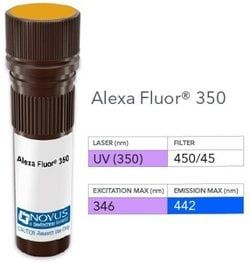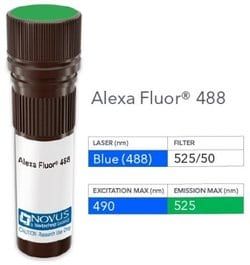CDX2 Antibody (PCRP-CDX2-1A3), Janelia Fluor™ 646, Novus Biologicals™
Manufacturer: Novus Biologicals
Select a Size
| Pack Size | SKU | Availability | Price |
|---|---|---|---|
| Each of 1 | NB008934-Each-of-1 | In Stock | ₹ 57,494.00 |
NB008934 - Each of 1
In Stock
Quantity
1
Base Price: ₹ 57,494.00
GST (18%): ₹ 10,348.92
Total Price: ₹ 67,842.92
Antigen
CDX2
Classification
Monoclonal
Conjugate
Janelia Fluor 646
Formulation
50mM Sodium Borate with 0.05% Sodium Azide
Gene Symbols
CDX2
Immunogen
Recombinant human full-length CDX2 protein (Uniprot: Q99626)
Quantity
0.1 mL
Research Discipline
Cancer, Chromatin Research, DNA Repair, Growth and Development, Transcription Factors and Regulators
Test Specificity
The specificity of this monoclonal antibody to its intended target was validated by HuProtTMArray, containing more than 19,000, full-length human proteins. The intestine-specific transcription factors CDX1 and CDX2 are important for directing intestinal development, differentiation, proliferation and maintenance of the intestinal phenotype. CDX2 protein expression has been seen in GI carcinomas. Anti-CDX2 has been useful to establish GI origin of metastatic adenocarcinomas and carcinoids and is especially useful to distinguish metastatic colorectal adenocarcinoma from lung adenocarcinoma. However, mucinous carcinomas of the ovary also express CDX2 protein. It limits the usefulness of this marker in the distinction of metastatic colorectal adenocarcinoma from mucinous carcinoma of the ovary.
Content And Storage
Store at 4°C in the dark.
Applications
Western Blot, Immunohistochemistry, Immunohistochemistry (Paraffin)
Clone
PCRP-CDX2-1A3
Dilution
Western Blot, Immunohistochemistry, Immunohistochemistry-Paraffin
Gene Alias
caudal type homeo box transcription factor 2, caudal type homeobox 2, Caudal-type homeobox protein 2, CDX-3, CDX3caudal type homeobox transcription factor 2, homeobox protein CDX-2
Host Species
Mouse
Purification Method
Protein A or G purified
Regulatory Status
RUO
Primary or Secondary
Primary
Target Species
Human
Isotype
IgG1 κ
Description
- CDX2 Monoclonal specifically detects CDX2 in Human samples
- It is validated for Immunohistochemistry, Immunohistochemistry-Paraffin.


